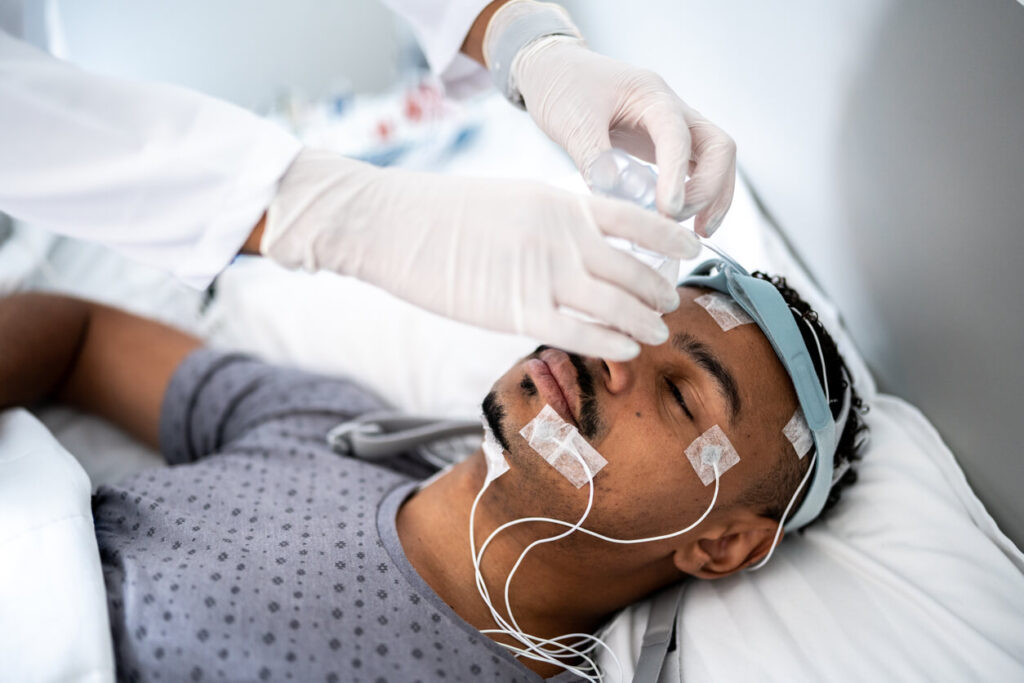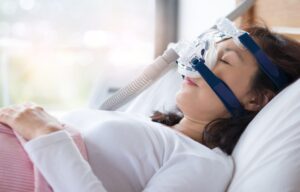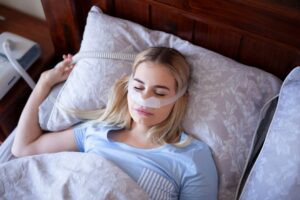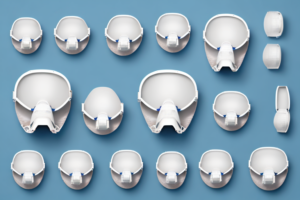Sleep Study Near Me: Locating Convenient Sleep Evaluation Centers

Have you been struggling to get a good night’s sleep? Are you constantly feeling tired and groggy during the day? If so, you may be experiencing a sleep disorder. But how can you know for sure? A sleep study can provide the answers you’re looking for. In this article, we will explore the importance of sleep studies, what to expect from a sleep evaluation center, factors to consider when choosing a center, how to find a sleep study center near you, and how to prepare for your first sleep study.
Understanding the Importance of Sleep Studies
Sleep studies play a crucial role in diagnosing sleep disorders. They help healthcare professionals understand what happens to your body while you sleep and determine if there are any underlying issues causing your sleep disturbances. By monitoring your brainwaves, heart rate, breathing patterns, and other vital signs, sleep studies provide valuable insights into your sleep quality and potential sleep disorders.
When you undergo a sleep study, you are connected to various monitoring devices that track different aspects of your body’s functions during sleep. Electrodes are placed on your scalp to measure brain activity, while belts around your chest and abdomen monitor your breathing patterns. A pulse oximeter is used to measure the oxygen levels in your blood, providing information on how well your body is functioning during sleep. All these data points are crucial in painting a comprehensive picture of your sleep health.
The Role of Sleep Studies in Diagnosing Sleep Disorders
Sleep studies are essential in identifying the specific type of sleep disorder you may have. Whether it’s sleep apnea, insomnia, restless leg syndrome, or narcolepsy, sleep studies can accurately diagnose these conditions. This diagnosis is crucial because it allows healthcare professionals to develop an effective treatment plan tailored to your specific needs.
Moreover, sleep studies can also uncover less common sleep disorders that may have gone undetected otherwise. Conditions like parasomnias (sleepwalking, night terrors) or circadian rhythm disorders can significantly impact your sleep quality and overall well-being. By undergoing a comprehensive sleep study, you give healthcare providers the necessary information to address these issues effectively.

Benefits of Undergoing a Sleep Study
Undergoing a sleep study offers various benefits. Firstly, it provides an accurate diagnosis, which, as mentioned earlier, allows for appropriate treatment. Secondly, it helps you understand the impact of poor sleep on your overall health. Chronic sleep deprivation can lead to serious health problems, such as heart disease, obesity, and diabetes. Lastly, a sleep study can improve your quality of life by addressing your sleep issues and helping you get the rest you need.
Additionally, the data collected during a sleep study can be used to monitor the effectiveness of your treatment plan over time. By comparing the results of multiple sleep studies, healthcare professionals can track improvements in your sleep patterns and make necessary adjustments to optimize your treatment. This ongoing monitoring ensures that you receive the best possible care for your sleep disorder, leading to long-term benefits for your health and well-being.
What to Expect from a Sleep Evaluation Center
Before you undergo a sleep study, it’s important to know what to expect from a sleep evaluation center. These centers are specifically designed to assess your sleep patterns and collect data that will assist in the diagnosis and treatment of sleep-related disorders.
When you arrive at a sleep evaluation center, you will be greeted by a team of sleep specialists who will guide you through the process with care and expertise. The environment is designed to be comfortable and conducive to sleep, resembling a cozy hotel room rather than a clinical setting. This helps ensure that you can relax and experience a typical night’s sleep, despite being in an unfamiliar place.
The Process of a Sleep Study
During a sleep study, you will spend a night at the sleep evaluation center, where your sleep will be monitored by a team of experts. They will attach various sensors to your body to measure brain activity, eye movement, muscle tone, breathing, and heart rate. It may seem overwhelming, but rest assured, the process is painless and non-invasive.
The sleep specialists will be monitoring your sleep throughout the night from a separate control room, ensuring that you are safe and comfortable at all times. If you need any assistance or have any concerns during the study, there will be staff members available to help and address any issues that may arise.

Types of Sleep Studies Conducted
There are different types of sleep studies conducted at evaluation centers. These include:
- Polysomnogram (PSG): This is the most common type of sleep study. It measures brain activity, eye movement, muscle tone, heart rate, and breathing patterns.
- Multiple Sleep Latency Test (MSLT): This study is used to diagnose narcolepsy. It measures how quickly you fall asleep during the day.
- Maintenance of Wakefulness Test (MWT): This study evaluates your ability to stay awake during a designated time. Learn more click here
Each type of sleep study serves a specific purpose in evaluating different aspects of your sleep patterns and behaviors. The data collected from these studies is crucial in helping your healthcare provider make an accurate diagnosis and develop an effective treatment plan tailored to your individual needs.
Factors to Consider When Choosing a Sleep Evaluation Center
When it comes to selecting a sleep evaluation center, there are a few key factors to consider. These factors will ensure that you choose a center that meets your needs and provides quality care.
Ensuring a good night’s sleep is crucial for overall health and well-being. Sleep evaluation centers play a vital role in diagnosing and treating various sleep disorders, such as sleep apnea, insomnia, and narcolepsy. By choosing the right center, you can take the first step towards improving your sleep quality and overall quality of life.
Proximity and Accessibility
One of the first factors to consider is the proximity and accessibility of the sleep evaluation center. Choose a center that is conveniently located to reduce travel time and make attending appointments easier.
Additionally, consider the center’s operating hours. Opt for a center that offers flexible scheduling options to accommodate your lifestyle and work commitments. This will make it easier for you to prioritize your sleep health without disrupting your daily routine.
Quality of Services and Equipment
Ensure that the center you choose offers high-quality services and uses state-of-the-art equipment. This will guarantee accurate results and a better overall experience.
State-of-the-art equipment, such as polysomnography machines and actigraphy devices, can provide detailed insights into your sleep patterns and help identify underlying sleep issues. Moreover, centers that offer a range of services, including home sleep studies and continuous positive airway pressure (CPAP) therapy, can provide comprehensive care tailored to your specific needs. Find more about actigraphy at https://stanfordhealthcare.org/medical-tests/s/sleep-disorder-tests/procedures/actigraphy.html
Staff Expertise and Patient Reviews
Research the expertise and qualifications of the center’s staff. Look for sleep evaluation centers with experienced professionals who specialize in diagnosing and treating sleep disorders. Additionally, read reviews and testimonials from previous patients to get an idea of their satisfaction with the center’s services.
Choosing a center with a multidisciplinary team of sleep specialists, including sleep physicians, respiratory therapists, and sleep technologists, can ensure that you receive comprehensive and personalized care. Positive patient reviews highlighting staff empathy, professionalism, and effectiveness in addressing sleep concerns can give you confidence in the center’s ability to meet your needs.
How to Find a Sleep Study Center Near You
Now that you know what to look for in a sleep evaluation center, it’s time to find one near you. Here are two methods that can help you locate a convenient sleep study center:
Utilizing Online Search Tools and Resources
The internet is a great resource for finding sleep study centers near you. Use search engines or specialized websites to locate centers in your area. These websites often provide information about the services offered, location, and contact details of the centers.
When using online search tools, it’s important to consider the credibility and reputation of the sleep study center. Look for reviews and testimonials from previous patients to get an idea of the quality of care and services provided. Additionally, check if the center is accredited by relevant organizations such as the American Academy of Sleep Medicine (AASM) to ensure that it meets high standards of patient care and safety.
Seeking Recommendations from Healthcare Providers
Another effective method is to seek recommendations from your healthcare provider. They can provide you with valuable insights and referrals to trusted sleep evaluation centers.
Your healthcare provider may have specific knowledge of your medical history and sleep patterns, allowing them to recommend a sleep study center that best suits your needs. They can also coordinate with the center to ensure that your evaluation and treatment plan align with your overall healthcare goals and any existing medical conditions.
Preparing for Your First Sleep Study
Preparing for your first sleep study can help ensure a smooth experience. Here’s what you need to know:
Before heading to your sleep study, it’s important to understand the process and what to expect. Sleep studies, also known as polysomnography, are painless and non-invasive tests that monitor your body during sleep. They help diagnose sleep disorders such as sleep apnea, insomnia, and restless leg syndrome. By monitoring your brain waves, heart rate, breathing, and movements during the night, specialists can gather valuable information to assess your sleep patterns.
What to Bring to Your Sleep Study
When packing for your sleep study, remember to bring comfortable clothing, toiletries, any prescribed medication, and personal items that will help you relax. It’s also crucial to discuss any concerns or questions you may have with the center beforehand.
Additionally, consider bringing items that will make your sleep environment feel more like home. This could include your own pillow, a favorite blanket, or soothing music to help you unwind before bedtime. Creating a familiar and comfortable setting can aid in achieving more accurate results during the study.
Understanding the Results of Your Sleep Study
After your sleep study, you will meet with a sleep specialist who will discuss the results with you. They will explain the findings, offer a diagnosis if necessary, and recommend the appropriate treatment options. Remember, understanding the results is key to getting the help you need to improve your sleep quality.
It’s important to ask questions during your results consultation to ensure you fully comprehend the findings. The specialist can provide insights into your sleep patterns, potential issues that were observed, and the significance of any abnormalities detected. This information will guide the development of a personalized treatment plan to address your specific sleep concerns.To conclude, locating a convenient sleep evaluation center is essential for diagnosing and treating sleep disorders. Understanding the importance of sleep studies, knowing what to expect from a center, considering key factors when selecting a center, utilizing search tools, and preparing for your first sleep study are all steps that will lead you to finding the help you need. Don’t let sleep troubles disrupt your life any longer – take the first step toward a good night’s sleep by locating a sleep study center near you.



